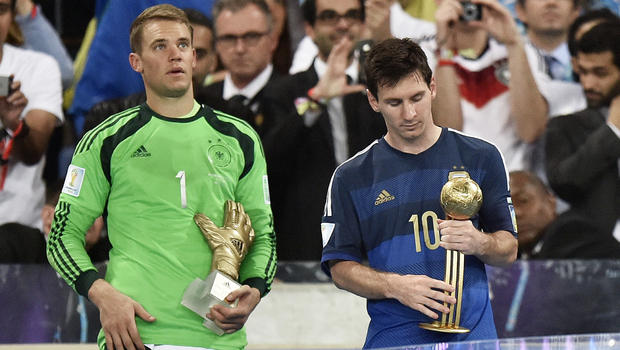A Messi International Record
The dust has barely settled at the end of the 2015 Copa America, but the post-mortems are already underway across the continent. While the party rages on in Santiago as Chile revels in its historic victory following the penalty shootout win over Argentina in the final, the mood has to be decidedly more somber down in Buenos Aires and the loss will surely be hanging heavily in the minds of Argentina’s players as they fan out across the globe in preparation for the upcoming season with their respective clubs.
“Missed opportunities…”
That seems to be the mantra of Lionel Messi’s international career, where time after time, his inclusion in an Argentina lineup has failed to provide the spark necessary to lift his country over the hump to international glory. Not including a victorious run to the gold medal with an under-23 squad at the 2008 Olympics in Beijing, Messi is now 0-for-6 at senior-level international tournaments since the 2006 World Cup, including 3 losing finals in which he was unable to play at the level he has become known for at club level.
At the end of the day, soccer is a team sport, and no matter how great a player may be, they will ultimately require a talented supporting cast around them. Even fellow Argentinian Diego Maradona had the likes of Jorge Valdano, Daniel Passarella, Jorge Burruchaga, and Oscar Ruggeri around him, in spite of the perception that his teams were one-man outfits. The best players in the world are not just fortunate if they have other great talent around them – the best players require such players around them to help enable the step to the next level.
http://gty.im/96760307
Messi has never lacked for such support from teammates throughout his entire career. Over the course of his international career (to say nothing of the stellar lineup he has been surrounded with during his time at Barcelona), he has had the following array of stars to work with, beginning with his international tournament debut at the 2006 World Cup in Germany:
Hernán Crespo, Maxi Rodriguez, Juan Pablo Sorin, Juan Román Riquelme, Javier Mascherano, Esteban Cambiasso, Roberto Ayala, Pablo Aimar, Gabriel Heinze, Juan Sebastián Verón, Gonzalo Higuaín, Walter Samuel, Javier Zanetti, Diego Milito, Javier Pastore, Carlos Tevez, Sergio Romero, Éver Banega, Fernando Gago, Ángel Di María, Ezequiel Garay, Martín Demichelis, Ezequiel Lavezzi, Sergio Agüero………the list reads like a veritable Who’s Who of Argentinian soccer’s best over the past decade.
When it comes to personnel, there are no excuses for Messi, given the caliber of players who have lined up with him for Argentina. Unlike Pelé and Maradona, the pressure has been off Messi to play as if his team’s fate depended solely on his ability to shine. Also unlike fellow candidate for “best player in the world” at this point of soccer history Cristiano Ronaldo, Messi has had better teams around him and better opportunities to shine.
However, it is Ronaldo who gets criticized far more often by the media and observers alike for a perceived inability to produce when it matters the most on the international stage, when it has been the Portuguese player who has at least scored in every major tournament for his country since 2004, whilst Messi fired blanks at the 2010 World Cup and 2011 Copa America.
The conventional wisdom has been Messi is held in much higher regard than Ronaldo because of the latter’s petulance and arrogance, when the truth is that he has matched Messi in personal charitable work off the pitch, and where Ronaldo has openly showed his emotions following Real Madrid or Portugal losses, Messi’s negative attitude has been no less on display.

The most famous example of this was his visible sulking following the 2010 World Cup final when he was awarded the Golden Ball as the best player of the tournament (an award that could arguably have been given to teammate Mascherano instead).
That demeanor came to the fore again on Saturday during the awards ceremony following the final, as reported by beIN Sports’ Tancredi Palmeri live from Santiago:
Unbelievable. Messi rejected the award for Best of Tournament of Copa America cause wanted to avoid the humiliation suffered at World Cup
— Tancredi Palmeri (@tancredipalmeri) July 5, 2015
That is the reason of the 10 minutes delay in ceremony.They tried to convince Messi.At the stadium we all wondered why nothing was happening
— Tancredi Palmeri (@tancredipalmeri) July 5, 2015
Whilst the claimed sentiment of rejecting the award on the basis of preferring to win team awards rather than individual awards seems admirable at first glance, there is also the not-so-small matter of the insult against the organizers of the tournament, the awards selection committee, and CONMEBOL. A great player is one who not only accepts defeat, but can display grace in the face of crushing loss.
Whether or not Lionel Messi is the greatest soccer player of all-time will always be a subjective debate that divides fans and observers everywhere. The nature of such a debate is shrouded in shades of gray, and it is definitely unfair to give wins and championships extra weight when determining such honors. After all, nobody doubts the merit of Johan Cruyff’s inclusion when talking about the best to ever play the game. There are also other intangibles such as tactics (for which Argentina manager Tata Martino has been raked over the coals for already) and injuries that come affect outcomes for all players, let alone the best in the game.
However, with all that being said, there are reasons why someone like Cruyff does not make a final cut when determining THE greatest of all time. Excellence at the club level, especially in major European leagues, help to build the case for all candidates, but ultimately (and again: fairly or unfairly), success at the international level will define those candidates.
Unfortunately for Messi, and even though it seems silly for anyone who has been aware of his accomplishments at Barcelona to suggest this, his international career up to this point is defined by failure and a lack of production when his countrymen needed it the most.
There is time, though it is not on his side. Messi should have his opportunity in at least one more World Cup and 2 Copa Americas to grab that elusive championship, and if he is able to stretch his career into his late 30s, there could even be two more tournaments on the cards (he would be 36 at the 2023 Copa America). Between now and whenever he chooses to call time on his career, Messi will have to redouble his efforts and be the talisman that Argentina wants him to be as they seek their first international title since 1993.
